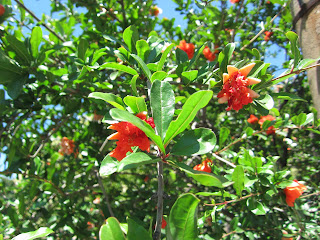Wednesday, 11 July 2012
POMEGRANATE
Pomegranate is definitely one of my all-time favourites. I normally consume it as a fruit even though I can never say no to some freshly squeezed pomegranate juice either.
Pomegranate fruit has many tasty and beneficial seeds and each seed is surrounded by a sac of sweet-tart juice contained by a thin skin. There are layers of seeds which are separated by paper-thin membranes.
After opening the pomegranate by scoring it with a knife and breaking it open, the seed casings (arils) are separated from the peel and internal white pulp membranes.
I love the sweet and/or savory taste as well as the watery texture, and the delicious dark red colour of it. However, I am also aware of its health benefits which makes me even more interested in this particular fruit. Below is some useful information on pomegranate which is used as fruit, juice, in syrups, sauces, in medicine, ink making, dye making, vinegar and so on.
Health benefits of pomegranate:
Especially in India, the rind of the fruit and the bark of the pomegranate tree is used as a traditional remedy against diarrhea, dysentery and intestinal parasites.
The seeds and juice are considered to be a tonic for the heart and throat.
The flower juice, rind and tree bark are believed to be useful for purposes such as stopping nose bleeds and gum bleeds, toning skin, (after blending with mustard oil) firming-up sagging breasts and treating hemorrhoids.
Pomegranate juice (of specific fruit strains) is also used as eyedrops as it is believed to slow the development of cataracts.
Pomegranate has been used as a contraceptive and abortifacient by means of consuming the seeds, or rind, as well as by using the rind as a vaginal suppository.
Pomegranate aril juice provides about 16% of an adult's daily vitamin C requirement per 100 ml serving.
It is a good source of vitamin B5, potassium and natural phenols, such as ellagitannins and flavonoids.
Pomegranates are listed as high-fiber in some charts of nutritional value
Its edible seeds supply unsaturated oils.
Pomegranate may be effective in reducing some heart disease risk factors.
Juice consumption may also inhibit viral infections.
Claimed to provide antioxidants.
Pomegranate extracts have antibacterial effects against dental plaque
The peel of pomegranate fruit may be used as tea to treat diarrhea.
Subscribe to:
Post Comments (Atom)



No comments:
Post a Comment
I love comments. Thank you for leaving one!